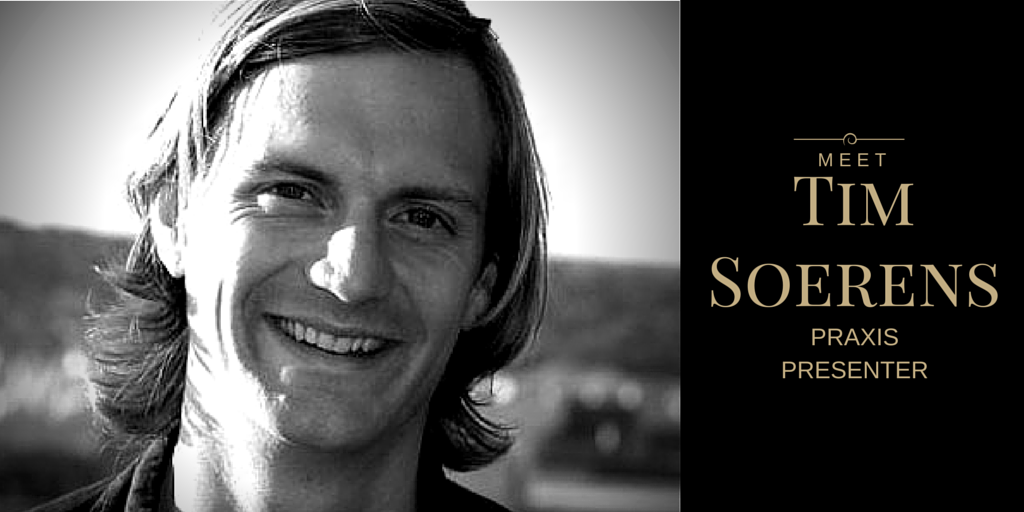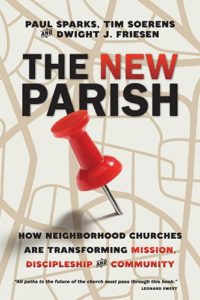The Praxis Gathering facilitates interaction among missional practitioners through the exchange of real-world, hands-in-the-soil experiences. Every Praxis Gathering presenter is currently engaging in missional practices and comes to the conversation with a passion to share what’s working in church planting and to inform against what’s not.
One such presenter is Tim Soerens, with whom you’ll get to spend time at Praxis Gathering 2015. Tim is a co-founding director of the Parish Collective, “a growing collective of churches, missional communities, and faith-based groups which are rooted in neighborhoods and linked across cities for Parish renewal” (Facebook). He offers his extensive experience in bringing together ministry leaders to address missional collaboration at the grassroots, neighborhood level. Tim consults many organizations that love to bless their communities in organized, intentional ways. Some examples of Tim’s praxis include serving as a founding adviser to Impact Hub-Seattle, a shared work and events space whose members spur one another and the community toward “purpose-driven ventures”; serving as a principle creator and instructor of Leadership in the New Parish, “an imaginative, collaborative, and transformative program” offered by The Seattle School of Theology and Psychology; working as a curator with Social Capital Markets, “the world’s largest gathering of socially-motivated investors and entrepreneurs”; and most recently co-founding Neighborhood Economics, a venture that serves as a nexus for visional entrepreneurs, ministry leaders, and investors working toward comprehensive renewal through local engagement.
The New Parish
Tim is also a coauthor of the book The New Parish: How Neighborhood Churches Are Transforming Mission, Discipleship and Community. The New Parish received a 2015 Christianity Today Award of Merit in the category The Church/Pastoral Leadership. Additionally, it received a 2014 Readers’ Choice Awards Honorable Mention, as well as a Hearts and Minds 2014 Best Books of the Year spot.
From the publisher: “‘When . . . faith communities begin connecting together, in and for the neighborhood, they learn to depend on God for strength to love, forgive and show grace like never before. . . . The gospel becomes so much more tangible and compelling when the local church is actually a part of the community, connected to the struggles of the people, and even the land itself.'”
“Paul Sparks, Tim Soerens and Dwight J. Friesen have seen—in cities, suburbs and small towns all over North America—how powerful the gospel can be when it takes root in the context of a place, at the intersection of geography, demography, economy and culture. This is not a new idea—the concept of a parish is as old as Paul’s letters to the various communities of the ancient church. But in an age of dislocation and disengagement, the notion of a church that knows its place and gives itself to where it finds itself is like a breath of fresh air, like a sign of new life.” (InterVarsity Press)
Tim Soerens Speaks on Church, Community, and Presence
In this video, hear Tim Soerens and Chris Smith, coauthor of Slow Church, discuss the local nature of the church.
The Shareable Soerens
As a contributing author to The V3 Movement blog, Tim has provided V3M church planters with some of the most shared and utilized resources. Most recently, Tim wrote an article addressing one of the primary realities of starting a church: “Don’t Try Too Hard to Start a Church. Do This Instead.”
From the article: “About a year ago I read the book The Lean Startup by Eric Ries and found myself choking up, especially at the beginning. This book is not written for church planters, it’s actually written for entrepreneurs, especially for those in the technology space. But I found myself wiping away tears during the first chapter. I also found myself shaking my head, wishing I had the opportunity to read this book before venturing out in starting a new church.”
“Why you might ask?” READ MORE
~
Tim’s prior article explored a new conversation around a faith community’s reputation and common practices. In “How Your Church Can Have a Reputation You Can Be Proud Of”, Tim wrote “Here’s my hunch: the future of the church will unfold as thousands and thousands of us commit to a communal set of practices. We will practice our way into a new future, and it will be so much more encouraging when it’s our practices that begin to define our default mode of learning from one another.” He open up a conversation that has continued since. You can read the entire article here.
[Tweet “the future of the church will unfold as we commit to a communal set of practices ~@timsoerens”]
Tim on the Word “Church”
The Secret Ingredient
In another of his posts, Tim shares what he describes as the secret ingredient of church planting.
“What’s the secret ingredient?” Soerens asks. “It’s deceptively simple:
geographic proximity + everyday life + God’s dream of renewing all of creation = a new game.
A growing number of churches are literally changing the game, which I think is incredibly encouraging. Here’s what I mean: The old game was to plop into a region with as much money as possible, attract as many of the Christians from other churches to your new thing, and scale up as many worship services as fast as possible. This game is still being played all the time, although with less regularity or intensity.” You can read the entire article here.
Join Tim Soerens and us this September.
“I want to meet Tim at The Praxis Gathering!”
Share this Post


